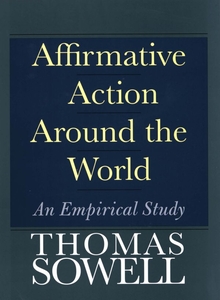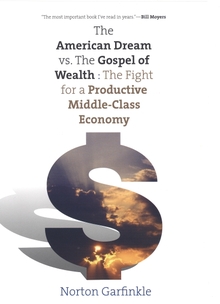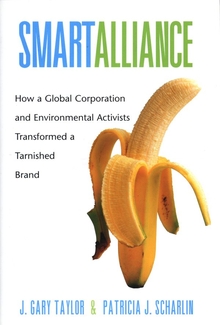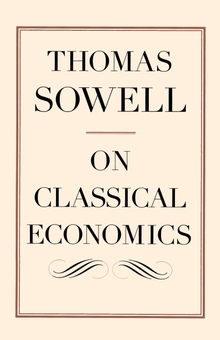Affirmative Action Around the World
WARNING
You are viewing an older version of the Yalebooks website. Please visit out new website with more updated information and a better user experience: https://www.yalebooks.com
An Empirical Study
Thomas Sowell
Out of Print
An eminent authority presents a new perspective on affirmative action in a provocative book that will stir fresh debate about this vitally important issue
This book moves the discussion of affirmative action beyond the United States to other countries that have had similar policies, often for a longer time than Americans have. It also moves the discussion beyond the theories, principles, and laws that have been so often debated to the actual empirical consequences of affirmative action in the United States and in India, Nigeria, Malaysia, Sri Lanka, and other countries. Both common patterns and national differences are examined. Much of what emerges from a factual examination of these policies flatly contradicts much of what was expected and much of what has been claimed.
A selection of the Conservative Book Club
From Affirmative Action Around the . . .
“Even when serious moral questions surround the past or present mistreatment of groups such as the untouchables in India or blacks in the United States, the remedies proposed rapidly spread far beyond redress of the misfortunes used to justify those remedies. Not only has the internal distribution of compensatory benefits borne little relationship—or even an inverse relationship—to the degree of misfortune within the affected groups, such benefits have spread to other groups far beyond the scope of the moral rationale and far exceeding in size the intended beneficiary groups.
Innumerable principles, theories, assumptions and assertions have been used to justify affirmative action programs—some common around the and some peculiar to particular countries or communities. What is remarkable is how seldom these notions have been tested empirically, or have even been defined clearly or examined logically, much less weighed against the large and often painful costs they entail. Despite sweeping claims made for affirmative action programs, an examination of their actual consequences makes it hard to support those claims, or even to say that these programs have been beneficial on net balance—unless you are prepared to say that any amount of social redress, however small, is worth any amount of costs and dangers, however large.”
“Another brilliant, bracing achievement by Thomas Sowell. With characteristic lucidity, erudition, and depth, Sowell examines the true effects of affirmative action around the globe. This book is compelling, important, mind-opening.”—Amy Chua, author of World on Fire: How Exporting Free Market Democracy Breeds Ethnic Hatred and Global Instability
“A masterpiece that deserves to be one of the most influential books of our time. Any honest reader will be informed and enlightened.”—Donald Kagan, Yale University
“A gem of a book. A brilliant and learned analysis of the negative effects of racially preferential policies both in the United States and in several other countries around the world.”—Stephan Thernstrom, Harvard University
“Invaluable argumentation [and] accessible.”—Booklist
“Invaluable argumentation [and] accessible.”—Booklist
“Among contemporary economists and social theorists, one of the most prolific, intellectually independent, and iconoclastic is Thomas Sowell. . . . Enormously learned, wonderfully clear-headed, he sees reality as it is, and flinches at no truth. . . . Sowell’s presentation of the data is instructive and illuminating—and disturbing.”—Carl Cohen, Commentary
“Affirmative Action is a delight: terse, well-argued and utterly convincing. . . . A fascinating tour. . . . Crammed with striking anecdotes and statistics.”—Economist
"[A] first-rate book. . . . This study shows that preferential policies generate tragic, unintended consequences, including violence, civil war, and perhaps genocide. Sowell focuses on affirmative action in five countries: India, Malaysia, Sri Lanka, Nigeria, and the United States. . . . The material is fresh."—Mitchell Langbert, Journal of Interdisciplinary Studies
"Sowell's book raises important and provocative issues and offers a wealth of resources on affirmative action policies and practices around the world. It makes a major contribution to the literature on the subject."—Katsuri DasGupta, H-Net Reviews
Publication Date: February 9, 2004









